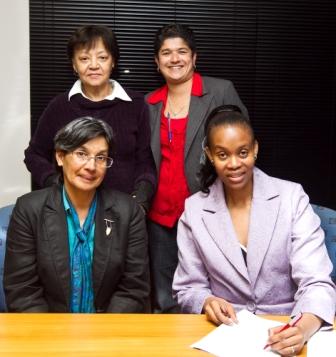
The Rhodes Sishen Iron Ore Company Community Development Trust (SIOC-cdt) teacher development project is officially launched on Friday (23 September 2011), in Kathu, in the Northern Cape.
Rhodes University has entered into a partnership with the SIOC-cdt to help educational practitioners to improve their skills and add value to their teaching.
The endeavour takes the form of three Bachelor of Education (in-service) degrees, offered by the Rhodes based Institute for the Study of English in Africa (ISEA); The Rhodes University Mathematics Education Project (RUMEP); and the Centre for Social Development (CSD) to teachers from the Northern Cape districts of Siyanda, John Taolo Gaetsewe and Frances Baart.
Degrees are offered in the Mathematics, English Language Teaching and Foundation Phase specialisations, and a total of 36 teachers per degree, have been accepted into the first four year cycle, bringing the total number of teachers participating to 108. The degree courses will begin in January 2012.
The over-riding academic motivation and hope for the BEd courses is to improve the quality of teachers' classroom practice and thereby education in the rural Northern Cape. RUMEP, ISEA and the CSD have to date carried out most of their teacher education work in rural Eastern Cape schools and they thus have much experience to draw on and much to learn from getting to know the different context of rural Northern Cape schools.
Teachers will be enrolled at Rhodes University on a full-time basis, with scheduled in-service training taking place at originating schools in the Northern Cape. Educators will attend contact teaching sessions at Rhodes of between 20 and 25 days a year, during which time they will accommodated in either University residences or boarding houses belonging to Victoria Girls High.
Two key considerations inform all three courses - firstly the focus to build and deepen teachers' content knowledge in each of the different fields and secondly to develop teachers as reflective practitioners, with the ability to critically reflect on their lessons - the planning, structure, sequencing and content of lessons; the nature of the activities and tasks that shape learners' engagement with the content and finally, teachers' engagement with learners and the content through their questions, instructions and explanations.
The benefits of the programme are many. Once the degree is completed, teachers will have acquired a specialised skill and increased knowledge in their chosen specialisation. The degree syllabi will be tailored keeping in mind the environment from which the teachers come and the practical conditions under which they practice.
Emphasis will be placed on collaboration between the Provincial Department of Education and Rhodes University, thereby ensuring that the material covered remains relevant to conditions on the ground.
Rhodes University is eminently suited to partnering with SIOC-cdt in this way. At Rhodes it is recognised that learning and education is a partnership of mutual commitment to the pursuit of knowledge and understanding, to the development of expertise and skills, and to the embrace of appropriate values and attitudes.
Students enrolled at Rhodes have the honour of studying at a very special and distinctive university, and one which commands an enviable academic reputation. It is, in addition, serious about embracing the challenges inherent in transformation, and to this end the institution has elevated community engagement to stand alongside the other core pillars of teaching, learning and research.
Picture: Front row left to right: Dr Monica Hendricks, Alan Macintosh Research Fellow at the Institute for the Study of English in Africa (ISEA), Ms Shiphra Chisha, acting CEO of the Sishen Iron Ore Company Community Development Trust signing the Memorandum of Understanding, (back row) Dr Rose Spannenberg, Director of Rhodes University Mathematics Education Project and Ms Vera Adams, Director of the Centre for Social Development.
By Jeannie McKeown
Picture by Judith Doubell
